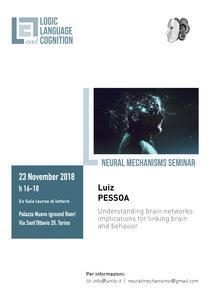Luiz Pessoa (University of Maryland) Understanding brain networks: implications for linking brain and behavior - Torino, 23 novembre 2018
Pubblicato: Martedì 20 novembre 2018

Center for Logic, Language, and Cognition (LLC)
Neural Mechanisms Online
Neural Mechanisms Online
Neural Mechanisms Seminar (physical & online)
23 November 2018
Physical conference
4-6 PM (Turin time)
via Sant'Ottavio 20, University of Turin, Palazzo Nuovo, Ex Sala lauree di lettere (ground floor).
To attend to the conference, check the following URLs (practical information below):
Luiz Pessoa (University of Maryland)
Understanding brain networks: implications for linking brain and behavior
(https://www.llc.unito.it/eventi/neural-mechanisms-luiz-pessoa)
(https://www.llc.unito.it/eventi/neural-mechanisms-luiz-pessoa)
Discussants
Marco TAMIETTO (physical, University of Turin, Italy)
Jesse WRIGHT (online, Stanford University, Canada)
What is the relationship between brain and behavior? The answer to this question necessitates characterizing the mapping between structure and function. I will discuss broad issues surrounding the link between structure and function in the brain that will motivate a network perspective to understanding this question. As others in the past, I argue that a network perspective should supplant the common strategy of understanding the brain in terms of individual regions. Whereas this perspective is needed for a fuller characterization of the mind-brain, it should not be viewed as panacea. For one, the challenges posed by the many-to-many mapping between regions and functions is not dissolved by the network perspective. Although the problem is ameliorated, one should not anticipate a one -to- one mapping when the network approach is adopted. Furthermore, decomposition of the brain network in terms of meaningful clusters of regions, such as the ones generated by community-finding algorithms, does not by itself reveal “true” subnetworks. Given the hierarchical and multi-relational relationship between regions, multiple decompositions will offer different “slices” of a broader landscape of networks within the brain. Finally, I described how the function of brain regions can be characterized in a multidimensional manner via the idea of diversity profiles. The concept can also be used to describe the way different brain regions participate in networks.
Center for Logic, Language, and Cognition (LLC)
University of Turin




